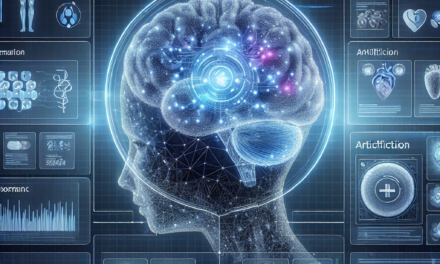Rethinking Clinical Practice: A Tech CMO’s Insights on AI’s Impact on Healthcare
The healthcare landscape is undergoing a seismic shift, driven by the rapid advancement of technology, particularly artificial intelligence (AI). As a Chief Medical Officer (CMO) in a tech-driven healthcare organization, I have witnessed firsthand the transformative potential of AI in clinical practice. This article delves into the multifaceted impact of AI on healthcare, exploring its implications for patient care, operational efficiency, clinical decision-making, and the ethical considerations that accompany its integration. We will also examine real-world examples and case studies that illustrate the profound changes AI is bringing to the healthcare sector.
The Evolution of AI in Healthcare
Artificial intelligence has been a buzzword in various industries for years, but its application in healthcare is particularly promising. The evolution of AI in healthcare can be traced through several key phases:
- Early Developments: The initial forays into AI in healthcare began in the 1970s with expert systems designed to assist in diagnosis. These systems, while rudimentary by today’s standards, laid the groundwork for more sophisticated applications.
- Data-Driven Approaches: The advent of electronic health records (EHRs) in the 1990s provided a wealth of data that AI systems could analyze. This shift enabled the development of predictive analytics and machine learning algorithms that could identify patterns in patient data.
- Deep Learning and Natural Language Processing: The last decade has seen significant advancements in deep learning and natural language processing (NLP), allowing AI to interpret complex medical data, including imaging and unstructured text from clinical notes.
- Integration into Clinical Workflows: Today, AI is increasingly being integrated into clinical workflows, assisting healthcare professionals in real-time decision-making and enhancing patient care.
As we look to the future, the potential for AI to revolutionize healthcare is immense. However, it is essential to approach this evolution thoughtfully, considering both the opportunities and challenges that lie ahead.
Enhancing Patient Care Through AI
One of the most significant impacts of AI in healthcare is its ability to enhance patient care. AI technologies are being utilized to improve diagnosis, personalize treatment plans, and monitor patient outcomes. Here are several ways AI is transforming patient care:
- Improved Diagnostics: AI algorithms can analyze medical images with remarkable accuracy. For instance, studies have shown that AI systems can detect conditions such as breast cancer in mammograms with a sensitivity comparable to that of expert radiologists. A notable example is Google’s DeepMind, which developed an AI system that outperformed human radiologists in identifying breast cancer.
- Personalized Medicine: AI can analyze genetic information and other patient data to tailor treatment plans to individual patients. This approach, known as precision medicine, allows for more effective treatments and better patient outcomes. For example, IBM Watson has been used to analyze cancer patients’ genetic data to recommend personalized treatment options.
- Remote Monitoring: AI-powered wearable devices and mobile applications enable continuous monitoring of patients’ health metrics. This technology is particularly beneficial for managing chronic conditions such as diabetes and heart disease. For instance, companies like Livongo use AI to provide real-time feedback to patients, helping them manage their conditions more effectively.
- Predictive Analytics: AI can predict patient deterioration by analyzing data from various sources, including EHRs and vital signs. This capability allows healthcare providers to intervene early, potentially saving lives. A study published in the journal “Nature” demonstrated that an AI model could predict sepsis in patients up to 48 hours before clinical recognition.
These advancements not only improve patient outcomes but also enhance the overall patient experience. By leveraging AI, healthcare providers can offer more timely, personalized, and effective care, ultimately leading to higher patient satisfaction.
Operational Efficiency and Cost Reduction
In addition to enhancing patient care, AI has the potential to significantly improve operational efficiency and reduce costs within healthcare organizations. Here are several ways AI is streamlining operations:
- Automating Administrative Tasks: AI can automate routine administrative tasks such as appointment scheduling, billing, and claims processing. This automation reduces the administrative burden on healthcare staff, allowing them to focus more on patient care. For example, chatbots powered by AI can handle patient inquiries and appointment bookings, freeing up staff time.
- Optimizing Resource Allocation: AI can analyze patient flow and resource utilization to optimize staffing and resource allocation. By predicting patient volumes, healthcare organizations can ensure they have the right number of staff and resources available at peak times. This optimization can lead to reduced wait times and improved patient satisfaction.
- Supply Chain Management: AI can enhance supply chain management by predicting demand for medical supplies and optimizing inventory levels. This capability helps healthcare organizations reduce waste and ensure they have the necessary supplies on hand when needed. For instance, AI-driven inventory management systems can analyze usage patterns to forecast future needs accurately.
- Telehealth Integration: The COVID-19 pandemic accelerated the adoption of telehealth, and AI is playing a crucial role in enhancing these services. AI can assist in triaging patients, analyzing symptoms, and providing virtual consultations, making healthcare more accessible and efficient.
By improving operational efficiency, AI not only reduces costs but also enhances the quality of care provided to patients. Healthcare organizations that embrace AI-driven solutions are better positioned to thrive in an increasingly competitive landscape.
AI in Clinical Decision-Making
AI is revolutionizing clinical decision-making by providing healthcare professionals with data-driven insights that enhance their ability to make informed choices. Here are several ways AI is influencing clinical decision-making:
- Clinical Decision Support Systems (CDSS): AI-powered CDSS can analyze patient data and provide evidence-based recommendations to clinicians. These systems can alert providers to potential drug interactions, suggest diagnostic tests, and recommend treatment options based on the latest clinical guidelines. For example, the Epic EHR system incorporates AI-driven decision support tools that assist clinicians in real-time.
- Risk Stratification: AI can help identify patients at high risk for adverse outcomes, enabling healthcare providers to prioritize interventions. For instance, machine learning algorithms can analyze patient demographics, medical history, and social determinants of health to predict which patients are at risk for hospital readmission.
- Clinical Trials and Research: AI is streamlining the process of identifying eligible patients for clinical trials, accelerating research and development. By analyzing EHR data, AI can match patients with appropriate trials based on their medical history and genetic profile. This capability not only speeds up the recruitment process but also enhances the diversity of trial participants.
- Real-Time Data Analysis: AI can analyze vast amounts of data in real-time, providing clinicians with up-to-date information that informs their decision-making. For example, AI algorithms can continuously monitor patient vitals and alert clinicians to any significant changes, allowing for timely interventions.
The integration of AI into clinical decision-making processes empowers healthcare professionals to deliver more accurate and effective care. By leveraging AI-driven insights, clinicians can make better-informed decisions that ultimately lead to improved patient outcomes.
Ethical Considerations and Challenges
While the potential benefits of AI in healthcare are substantial, it is essential to address the ethical considerations and challenges that accompany its integration. Here are several key issues that must be considered:
- Data Privacy and Security: The use of AI in healthcare relies heavily on access to patient data. Ensuring the privacy and security of this data is paramount. Healthcare organizations must implement robust data protection measures to safeguard patient information from breaches and unauthorized access.
- Bias and Fairness: AI algorithms can inadvertently perpetuate biases present in the training data. If not carefully monitored, AI systems may produce biased outcomes that disproportionately affect certain patient populations. It is crucial to ensure that AI models are trained on diverse datasets to mitigate this risk.
- Informed Consent: Patients must be informed about how their data will be used in AI applications. Obtaining informed consent is essential to maintaining trust between patients and healthcare providers. Clear communication about the benefits and risks of AI technologies is necessary.
- Accountability and Liability: As AI systems become more integrated into clinical practice, questions of accountability and liability arise. Determining who is responsible for errors made by AI systems—whether it be the healthcare provider, the technology developer, or the organization—requires careful consideration and legal frameworks.
Addressing these ethical considerations is critical to ensuring that the integration of AI in healthcare is done responsibly and equitably. Stakeholders must work collaboratively to establish guidelines and best practices that prioritize patient safety and ethical standards.
Conclusion: Embracing the Future of Healthcare
The integration of AI into healthcare is not just a trend; it represents a fundamental shift in how we approach patient care, operational efficiency, and clinical decision-making. As a tech CMO, I believe that embracing AI offers immense opportunities to enhance the quality of care we provide to patients while also improving the efficiency of healthcare organizations.
However, it is essential to navigate the challenges and ethical considerations that accompany this transformation thoughtfully. By prioritizing data privacy, addressing bias, and ensuring accountability, we can harness the full potential of AI to create a more equitable and effective healthcare system.
As we look to the future, collaboration among healthcare providers, technology developers, policymakers, and patients will be crucial in shaping the next generation of healthcare. Together, we can leverage AI to create a healthier world for all.





